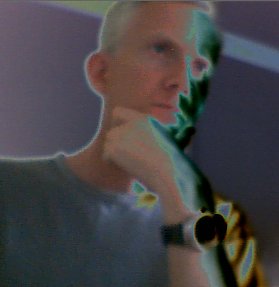Our director James took a quick lesson in working the desk from our helpful engineer and minder Alberto. We found a glass of water for the day's featured actor, and got going. (No expense spared, you see.)
The approach we're using is to record each of the characters' lines on their own, and then combine them in the edit. The idea is to bring some flavour of the characters' separateness, as well as their interactions. This should preserve the Twitterness of the play while also letting it work as drama. It'll also let us use different recording venues, including, perhaps, outside locations.
The wonderful Kiki Kendrick is playing @fragharpy, or Francine Harpur, as she's known in the real world. Though, as Kiki demonstrates in her sensitive and insightful performance, Francine's connection with the real world may well be a little tenuous.
We worked from about 2pm to, um, sometime after 6pm, with a Costa's break at 4pm. All of @fragharpy's lines were captured, and we felt pleased with what we achieved. It's great to have the play up and running - Kiki's brought @fragharpy to life and the character is calling out to the others... Now we're lining up the other actors to do their pieces.
